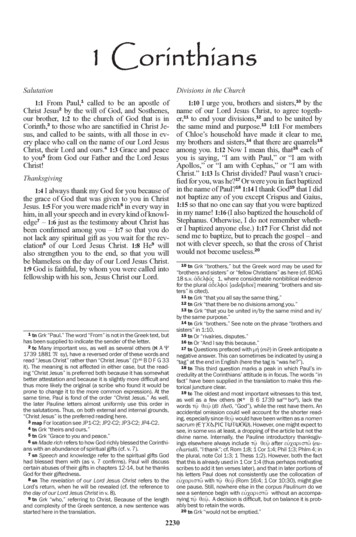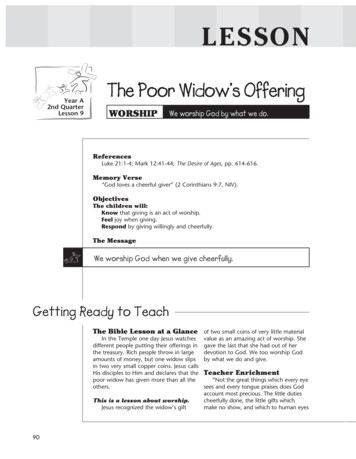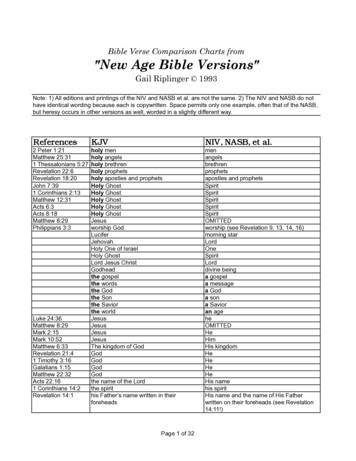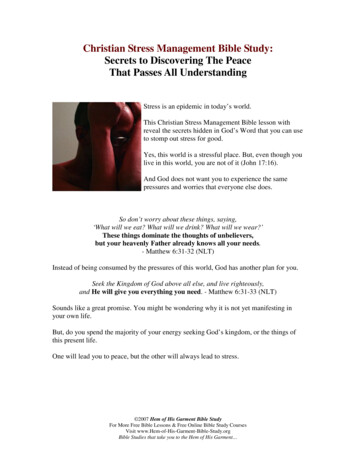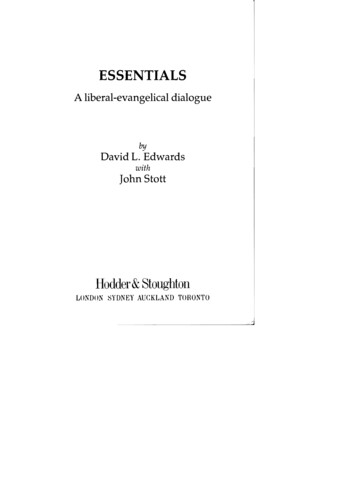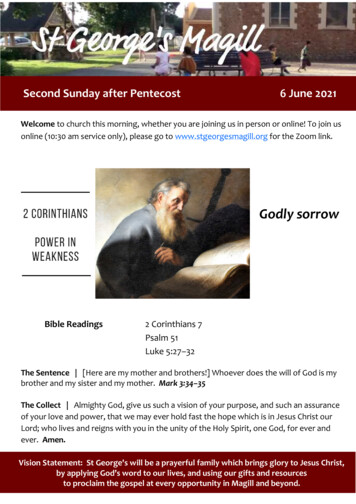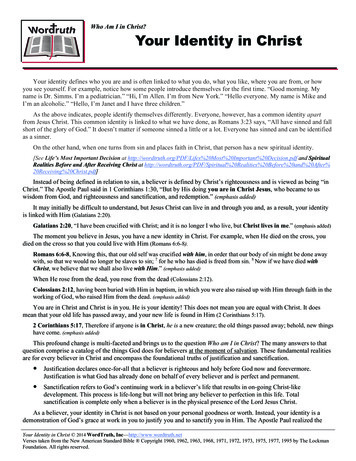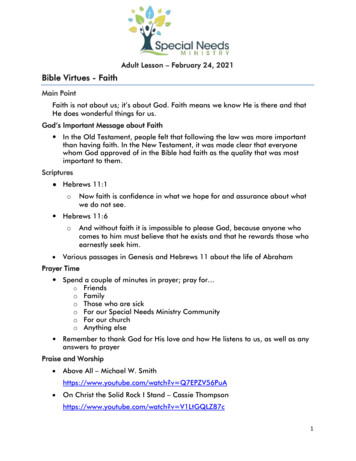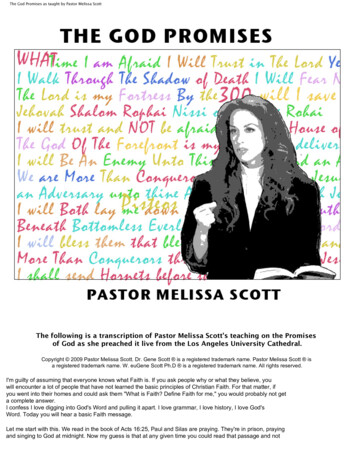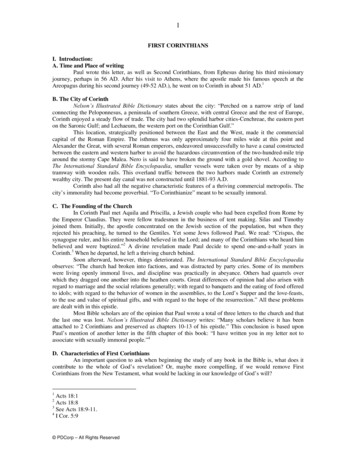
Transcription
1FIRST CORINTHIANSI. Introduction:A. Time and Place of writingPaul wrote this letter, as well as Second Corinthians, from Ephesus during his third missionaryjourney, perhaps in 56 AD. After his visit to Athens, where the apostle made his famous speech at theAreopagus during his second journey (49-52 AD.), he went on to Corinth in about 51 AD.1B. The City of CorinthNelson’s Illustrated Bible Dictionary states about the city: “Perched on a narrow strip of landconnecting the Peloponnesus, a peninsula of southern Greece, with central Greece and the rest of Europe,Corinth enjoyed a steady flow of trade. The city had two splendid harbor cities-Cenchreae, the eastern porton the Saronic Gulf; and Lechaeum, the western port on the Corinthian Gulf.”This location, strategically positioned between the East and the West, made it the commercialcapital of the Roman Empire. The isthmus was only approximately four miles wide at this point andAlexander the Great, with several Roman emperors, endeavored unsuccessfully to have a canal constructedbetween the eastern and western harbor to avoid the hazardous circumvention of the two-hundred-mile triparound the stormy Cape Malea. Nero is said to have broken the ground with a gold shovel. According toThe International Standard Bible Encyclopaedia, smaller vessels were taken over by means of a shiptramway with wooden rails. This overland traffic between the two harbors made Corinth an extremelywealthy city. The present day canal was not constructed until 1881-93 A.D.Corinth also had all the negative characteristic features of a thriving commercial metropolis. Thecity’s immorality had become proverbial. “To Corinthianize” meant to be sexually immoral.C. The Founding of the ChurchIn Corinth Paul met Aquila and Priscilla, a Jewish couple who had been expelled from Rome bythe Emperor Claudius. They were fellow tradesmen in the business of tent making. Silas and Timothyjoined them. Initially, the apostle concentrated on the Jewish section of the population, but when theyrejected his preaching, he turned to the Gentiles. Yet some Jews followed Paul. We read: “Crispus, thesynagogue ruler, and his entire household believed in the Lord; and many of the Corinthians who heard himbelieved and were baptized.”2 A divine revelation made Paul decide to spend one-and-a-half years inCorinth.3 When he departed, he left a thriving church behind.Soon afterward, however, things deteriorated. The International Standard Bible Encyclopaediaobserves: “The church had broken into factions, and was distracted by party cries. Some of its memberswere living openly immoral lives, and discipline was practically in abeyance. Others had quarrels overwhich they dragged one another into the heathen courts. Great differences of opinion had also arisen withregard to marriage and the social relations generally; with regard to banquets and the eating of food offeredto idols; with regard to the behavior of women in the assemblies, to the Lord’s Supper and the love-feasts,to the use and value of spiritual gifts, and with regard to the hope of the resurrection.” All these problemsare dealt with in this epistle.Most Bible scholars are of the opinion that Paul wrote a total of three letters to the church and thatthe last one was lost. Nelson’s Illustrated Bible Dictionary writes: “Many scholars believe it has beenattached to 2 Corinthians and preserved as chapters 10-13 of his epistle.” This conclusion is based uponPaul’s mention of another letter in the fifth chapter of this book: “I have written you in my letter not toassociate with sexually immoral people.”4D. Characteristics of First CorinthiansAn important question to ask when beginning the study of any book in the Bible is, what does itcontribute to the whole of God’s revelation? Or, maybe more compelling, if we would remove FirstCorinthians from the New Testament, what would be lacking in our knowledge of God’s will?1Acts 18:1Acts 18:83See Acts 18:9-11.4I Cor. 5:92 PDCorp – All Rights Reserved
2Since this epistle is written as a reaction to oral reports Paul had received about undesirableconditions in the church in Corinth,5 and also in answer written questions that had been sent to him,6 itreveals much about life in a local church. Some of the problems and answers are very relevant to moderntimes; others have lost some of their relevance because they related to local and cultural conditions, whichno longer exist in our day.What makes First Corinthians such a beautiful and important letter is the fact that Paul nowhereuses the strong language we find in his Epistle to the Galatians. The sins of Corinth were sins of carnality,sins that were covered by the blood of Jesus Christ as revealed in the Gospel. The sins of Galatia werespiritual sins, sins against the Gospel itself, sins against the Holy Spirit. Paul answers every problem in thechurch and in personal lives with a powerful presentation of the cross.In no other of the apostle’s epistles do we see so clearly what life in a local church ought to be asin this letter. Nothing in Paul’s other letters compares to the exquisite poetry of Chapter Thirteen, thechapter on love; nowhere is the importance and the meaning of the resurrection of the body explained as inChapter Fifteen. The Bible would, in fact, be poorer if we left First Corinthians out.E. Outline of the EpistleFor an outline of First Corinthians we follow the one given by Nelson’s Illustrated BibleDictionary.Part One: In Answer to Chloe’s Report of DivisionsI.IntroductionII.Report of DivisionsIII.Reasons for DivisionA. Misunderstanding of the Gospel MessageB. Misunderstanding of the Gospel MessengerC. Misunderstanding of Paul’s MinistryPart Two: In Answer to Reports of FornicationI.On IncestA. Deliver the Fornicators for DisciplineB. Separate Yourselves from Immoral BelieversII.Concerning Litigation Between BelieversIII.Warning Against Sexual ImmoralityPart Three: In Answer to the Letter of QuestionsI.Counsel Concerning MarriageA. Principles for Married LifeB. Principles for the Married BelieverC. Principle of Abiding in God’s CallD. Principles for the UnmarriedE. Principles for RemarriageII.Counsel Concerning Things Offered to IdolsA. Principles of Liberty and the Weaker BrotherB. Illustration of Paul and His LibertyC. Warning against Forfeiting LibertyD. Exhortation to Use Liberty to Glorify GodIII.Counsel Concerning Public WorshipA. Principles of Public PrayerB. Rebuke of Disorders at the Lord’s SupperC. Principles of Exercising Spiritual Gifts1. The Unity of the Body12:1-312. The Most Excellent Way13:1-133. The Proper Exercise of Gifts14:1-40IV.Counsel Concerning the Resurrection56See I Cor. 1:11; 5:1.See I Cor. 7:1. PDCorp – All Rights 2:1--14:4015
3V.VI.A. Fact of Christ’s ResurrectionB. Importance of Christ’s ResurrectionC. Order of the ResurrectionsD. Moral Implications of Christ’s ResurrectionE. Bodies of the Resurrected DeadF. Bodies of the Translated LivingCounsel Concerning the Collection for 15:35-5015:51-5816:1-416:5-24F. The TextPart One: In Answer to Chloe’s Report of DivisionsI.Introduction(1:1--4:21)1:1-91 Paul, called to be an apostle of Christ Jesus by the will of God, and our brother Sosthenes,2 To the church of God in Corinth, to those sanctified in Christ Jesus and called to be holy, togetherwith all those everywhere who call on the name of our Lord Jesus Christ-their Lord and ours:3 Grace and peace to you from God our Father and the Lord Jesus Christ.4 I always thank God for you because of his grace given you in Christ Jesus.5 For in him you have been enriched in every way-in all your speaking and in all your knowledge6 because our testimony about Christ was confirmed in you.7 Therefore you do not lack any spiritual gift as you eagerly wait for our Lord Jesus Christ to berevealed.8 He will keep you strong to the end, so that you will be blameless on the day of our Lord Jesus Christ.9 God, who has called you into fellowship with his Son Jesus Christ our Lord, is faithful.The Greek reads literally: “Paul, called, an apostle of Jesus Christ and Sosthenes, the brother.”Since the word apostle is derived from the Greek verb “to send,” Paul refers in this greeting to his call andhis ministry, thus establishing his authority over the church in Corinth. This authority is not emphasizedhere as strongly as it is in his Epistle to the Galatians, where he writes: “Paul, an apostle-sent not from mennor by man, but by Jesus Christ and God the Father, who raised him from the dead.”7 As we saw above, theissues in Corinth were not of the same character and weight as in Galatia. But since some members of theCorinthian church, evidently, questioned Paul’s apostleship, the mention of it in this address is important.From the first line of this letter, Paul wanted to make sure that the Corinthians understood his authority. Atseveral places in this letter, Paul refers to this point.Apart from his God-given authority as an apostle, Paul had the authority of a father, as he writes ina later chapter: “Am I not free? Am I not an apostle? Have I not seen Jesus our Lord? Are you not the resultof my work in the Lord? Even though I may not be an apostle to others, surely I am to you! For you are theseal of my apostleship in the Lord.”8 The Matthew Henry’s Commentary observes: “It was not pride inPaul, but faithfulness to his trust, in this juncture, to maintain his apostolical character and authority.”When Paul stayed in Corinth at his first extended visit of one-and-a-half year, the head of thesynagogue was Sosthenes. He had replaced Crispus, of whom we read: “Crispus, the synagogue ruler, andhis entire household believed in the Lord; and many of the Corinthians who heard him believed and werebaptized.”9 There is no record of this Sosthenes’ conversion. But we read that, during a local riot of theJews against the Christians in Corinth, the Jews “all turned on Sosthenes the synagogue ruler and beat himin front of the court.”10 We conclude from this that Sosthenes must have shown at least some sympathytoward Christians at that time. How and why he joined Paul after the apostle left Corinth is not stated.Some Bible scholars, however, doubt that this Sosthenes is the same as the one mentioned in Acts. It seemsvery likely that he is, since Paul did not feel any need to introduce him further than to call him “ourbrother.”7See Gal. 1:1.I Cor. 9:1,29Acts 18:810Acts 18:178 PDCorp – All Rights Reserved
4The address in these opening verses follows the normal formula of letter writing at that time. Aletter started with the name of the writer, followed by the addressee, and a greeting. In Acts we find anexample of a business letter, written by a Roman military commander to the governor, with the sameopening formula: “Claudius Lysias, To His Excellency, Governor Felix: Greetings.”11 Paul more thanembellishes this formula by packing a Gospel nugget in it. He tells the Corinthians that they are “sanctifiedin Christ Jesus and called to be holy.” The Greek word for “sanctified” is hagiazo, meaning, “to makeholy”; it is derived from the word hagios, “holy.” Paul uses both the verb and the noun form of the sameword in this sentence.The brief message in this greeting to the Corinthians, “together with all those everywhere who callon the name of our Lord Jesus Christ-their Lord and ours,” is: Jesus Christ made you holy, now becomewhat you are!The words: “together with all those everywhere who call on the name of our Lord Jesus Christtheir Lord and ours” extend the content of this epistle to all believers worldwide. Almost unnoticeably, thelordship of Jesus Christ is highlighted. The addition “their Lord and ours” establishes the relationshipbetween Jesus and us; we owe Him our obedience. It is easy to call Him: “Our Lord Jesus Christ.” Theconfession “He is our Lord” demands obedience. Jesus emphasizes this: “Not everyone who says to me,‘Lord, Lord,’ will enter the kingdom of heaven, but only he who does the will of my Father who is inheaven.”12The greeting “Grace and peace,” the Greek and Hebrew greetings charis and shalom combined, isthe trademark of all Paul’s epistles. We find it in the opening verses of Romans through Philemon.Although the church in Corinth was plagued by several severe problems, Paul did not open thisepistle on a negative note. His opening statement reveals that he believed that God is the one who buildsHis church. During his first visit to Corinth, when he witnessed the birth of this church, Paul saw clearsigns of the work of the Holy Spirit in human hearts. He, therefore, expressed the conviction that Godwould see this church through and that “the gates of hell shall not prevail against it.”13 When Jesus spokethe words that are in quotation marks here to Peter, He added: “I will give you the keys of the kingdom ofheaven; whatever you bind on earth will be bound in heaven, and whatever you loose on earth will beloosed in heaven.”14 Paul’s confidence that God would keep them strong to the end, so that they would beblameless on the day of our Lord Jesus Christ, did not make him lean back and refrain from dealing withthe problems. He took the keys that Jesus had given him as an apostle and began to tackle them.The spiritual features that characterized the church in Corinth were the spiritual gifts with whichthe Holy Spirit had endowed them, the most outstanding ones being speaking and knowledge. This epistledeals with those gifts in the Chapters Twelve and Fourteen. Knowledge can be a dangerous gift if it isexercised without love. This is obvious from the apostle’s introduction to the question of eating meat thatwas dedicated to idols. We read in Chapter Eight: “We know that we all possess knowledge. Knowledgepuffs up, but love builds up. The man who thinks he knows something does not yet know as he ought toknow. But the man who loves God is known by God.”15II.Reports of Divisions1:10-1710 I appeal to you, brothers, in the name of our Lord Jesus Christ, that all of you agree with oneanother so that there may be no divisions among you and that you may be perfectly united in mind andthought.11 My brothers, some from Chloe’s household have informed me that there are quarrels among you.12 What I mean is this: one of you says, "I follow Paul"; another, "I follow Apollos"; another, "Ifollow Cephas"; still another, "I follow Christ."13 Is Christ divided? Was Paul crucified for you? Were you baptized into the name of Paul?14 I am thankful that I did not baptize any of you except Crispus and Gaius,15 so no one can say that you were baptized into my name.16 (Yes, I also baptized the household of Stephanas; beyond that, I don’t remember if I baptized anyoneelse.)11Acts 23:26Matt. 7:21,2213Matt. 16:18 – KJV14Matt. 16:1915I Cor. 8:1-312 PDCorp – All Rights Reserved
517 For Christ did not send me to baptize, but to preach the gospel-not with words of human wisdom, lestthe cross of Christ be emptied of its power.The NIV leaves out the word “now” with which Paul makes the transition from recommendationto reproof. The reason for the admonition was an oral report from “some from Chloe’s household” thatthere was disagreement among the church members to the point that a split in the church was threatening.Paul appeals to the church “in the name of our Lord Jesus Christ” that they have a look at thedivisions that are tearing the church apart. In doing so, he speaks authoritatively in the Name of Jesus, asHis representative. Yet, the words “I appeal,”16 or “I beseech you,”17 or “I plead with you”18 have acompassionate ring.The Greek word, rendered “perfectly united” is katertismenoi, which is the passive perfectparticiple of katartizo, “to repair or adjust.” The Wycliffe Bible Commentary calls it: “A versatile Greekword, used of the adjustment of parts of an instrument, of the setting of bones by a physician, of themending of nets (Mark 1:19), as well as of the outfitting of a ship for a voyage.” Particularly the impliedmeaning of the tuning of an instrument illustrates well what Paul had in mind when he said he wanted thechurch members to “agree with one another,” or “speak the same thing.”19 This does not mean using thesame words but being in harmony with one another. There is actually a danger within a church ordenomination to develop a “lingo” that expels outsiders. An instrument is in tune, not when all the chordsare on the same pitch, but when they all agree with one another. Paul expressed the same thought, althoughwith different words in his Epistle to the Philippians: “make my joy complete by being like-minded, havingthe same love, being one in spirit and purpose.”20The harmony of a church consists, first of all in the common belief of its basic doctrines. But meredoctrinal agreement does not produce the unity Paul wanted to see. The realization of the members thatthey share the same experience of being saved by God’s grace, washed of their sins in the same blood ofthe Lord Jesus Christ, and being filled with the same Holy Spirit is what produces the testimony of theharmony of love.The church of Corinth, instead of evincing this harmony, was in the process of splitting up alongparty lines. Paul mentions four names of people who had influenced the church: Paul, Apollos, Peter (orCephas), and Jesus Christ Himself.The root of all contention is pride. The Book of Proverbs warns: “Pride only breeds quarrels, butwisdom is found in those who take advice.”21 The lines of demarcation were probably drawn according towho had been instrumental in the conversion of certain individuals. Paul, being the founder of the church,obviously merited the loyalty of the charter members. It is not abnormal that young converts model theirspiritual lives after those who were used by God in their conversion; it is not even unhealthy. But to keepon doing so is indicative of spiritual immaturity. Paul states as much, later on in this epistle: “Brothers, Icould not address you as spiritual but as worldly-mere infants in Christ. I gave you milk, not solid food, foryou were not yet ready for it. Indeed, you are still not ready. You are still worldly. For since there isjealousy and quarreling among you, are you not worldly? Are you not acting like mere men? For when onesays, ‘I follow Paul,’ and another, ‘I follow Apollos,’ are you not mere men?”22 The issue was not thatpeople had preferences for one church leader over another; the trouble was that they used this as a means ofconfrontation and division between one another. The problem was carnality, the sin of pride.Paul was the father of the church in Corinth. It was not bad that the members of the churchmodeled themselves after their founder. Paul even encouraged this. He writes: “Even though you have tenthousand guardians in Christ, you do not have many fathers, for in Christ Jesus I became your fatherthrough the gospel. Therefore I urge you to imitate me.”23Apparently, Apollos arrived in Corinth when Paul was still there. Luke records in Acts:“Meanwhile a Jew named Apollos, a native of Alexandria, came to Ephesus. He was a learned man, with a16NIVKJV18NKJV19KJV20Phil. 2:221Prov. 13:1022I Cor. 3:1-423I Cor. 4:15,1617 PDCorp – All Rights Reserved
6thorough knowledge of the Scriptures. He had been instructed in the way of the Lord, and he spoke withgreat fervor and taught about Jesus accurately, though he knew only the baptism of John. He began tospeak boldly in the synagogue. When Priscilla and Aquila heard him, they invited him to their home andexplained to him the way of God more adequately.”24 Luke also states that when Paul left, Priscilla andAquila accompanied him.25 We conclude, therefore, that Apollos’ arrival in Corinth occurred while Paul,Aquila, and Priscilla were all still there.The Pulpit Commentary states about Apollos: “Apollos personally was absolutely loyal andhonorable, but his visit to Corinth had done mischief. His impassioned oratory, his Alexandrianrefinements, his allegorizing exegesis, the culture and polish of his style, had charmed the fickleCorinthians. The Apollonians were the party of culture. They had, as we see from later parts of the Epistle,exaggerated St. Paul’s views, as expounded by Apollos, into extravagance. Puffed up with the conceit ofknowledge, they had fallen into moral inconsistency. The egotism of oratorical rivals, the contemptuoustone towards weaker brethren, the sophistical condonations of vice, were probably due to them. Apollos, aswe see by his noble refusal to visit Corinth under present circumstances ( 1 Corinthians 16:12), was asindignant as St. Paul himself at the perversion of his name into an engine of party warfare.”The Peter party is often unjustly characterized as the legalistic one, mainly consisting of Jewishbelievers. Most Bible scholars, focusing on Paul’s disagreement with Peter in Antioch,26 have a hard timeforgiving Peter for his slip. We have no scriptural proof that Peter ever became or remained a hard-lineJudaist. We have no record of Peter’s version of his disagreement with Paul either. It seems more logical toassume that some Jewish Corinthians heard Peter’s sermon in Jerusalem on the day of Pentecost. AlthoughAchaians are not specifically mentioned in the list of those present,27 it is possible they were there. SomeCorinthians, therefore, may have been Peter’s converts.If it were not for the fact that Paul does whole-heartedly embrace those who proclaim: “I followChrist,” we would tend to think that they were the only spiritually sound group in the church. The problemseems to be that those followers of Christ became a party to themselves, adding to the division instead oflessening the tensions in the church. They were as much driven by pride as the others, exuding a “holierthan thou” attitude. In his second epistle to the church Paul addresses them with: “You are looking only onthe surface of things. If anyone is confident that he belongs to Christ, he should consider again that webelong to Christ just as much as he.”28 Jesus command to His followers is: “If anyone would come afterme, he must deny himself and take up his cross daily and follow me.”29 Paul’s emphasis on the cross in thesecond part of this chapter suggests that those who proclaimed to be Christ’s followers did not take up thecross. The “followers of Christ” were part of the problem instead of the solution.The Matthew Henry’s Commentary laments: “So liable are the best things in the world to becorrupted, and the gospel and its institutions, which are at perfect harmony with themselves and oneanother, to be made the engines of variance, discord, and contention. This is no reproach to our religion, buta very melancholy evidence of the corruption and depravity of human nature. Note how far will pride carryChristians in opposition to one another! Even so far as to set Christ and his own apostles at variance, andmake them rivals and competitors.”The answer of each of Paul’s three questions in Verse 13 is “No.” Christ is not divided, nor is Hisbody, the church. Those who practice divisions thus exclude themselves from the body of the Lord.Recognition of membership means acknowledgment of unity among the members.The question: “Was Paul crucified for you?” not only requires a negative answer, it also guidesour thoughts in the direction of the solution to all divisions. We belong to Christ, because He died for us onthe cross. We ought to have died, but He took our place. Even if Paul ended his life on a cross, as Petersupposedly did, it would not have had the same value as a substitution as Jesus’ death in our behalf. It isJesus’ death on the cross that reduces our life and our ego to nothing. Paul expresses the meaning of this inhis second epistle: “For Christ’s love compels us, because we are convinced that one died for all, and24Acts 18:24-26See Acts 18:18.26See Gal. 2:11-15.27See Acts 2:9-11.28II Cor. 10:729Luke 9:2325 PDCorp – All Rights Reserved
7therefore all died. And he died for all, that those who live should no longer live for themselves but for himwho died for them and was raised again.”30When Paul mentions baptism, he speaks about the meaning of baptism as identification with thedeath and resurrection of Christ. Since Paul had not been crucified for them and had not risen from thedead, connecting the ritual with his person would have been absurd. The Pulpit Commentary comments:“This outburst of feeling is very important, as proving the immeasurable distance which, in Paul’s ownview, separated him from his Lord. It is also instructive to see how St. Paul at once denounces the spirit ofparty without deigning to enter into the question as to which party of these wrangling “theologians” wasmost or least in the right. He did not choose to pander to their sectarian spirit by deciding between theirvarious forms of aggressive orthodoxy.” Immediately following, though, the apostle does refer to the ritualwhen trying to remember whom he baptized in Corinth. He baptized Crispus and Gaius. Luke refers to thisbaptism of Crispus: “Crispus, the synagogue ruler, and his entire household believed in the Lord; and manyof the Corinthians who heard him believed and were baptized.”31 As an afterthought, the baptism ofStephanas and his family is mentioned. Paul calls them “the first converts in Achaia.”32 Stephanas isnowhere mentioned in the Book of Acts, so we know no details about this baptism. In the phrase “Christdid not send me to baptize” Paul uses the verb of which the noun “apostle” is formed. We could thereforeread: “Christ did not make me an apostle to baptize.” This does not mean that he never baptized anyone, aswe saw. Rather, the apostle distances himself from the ritual as opposed to the content of baptism. Ifbaptism in water is detached from the baptism by the Holy Spirit, “the cross of Christ [becomes] emptied ofits power.” The real baptism is the one Paul mentions in Chapter Twelve, where we read: “For we were allbaptized by one Spirit into one body-whether Jews or Greeks, slave or free-and we were all given the oneSpirit to drink.”33III.Reasons for DivisionA. Misunderstanding of the Gospel Message1:18--4:211:18--3:418 For the message of the cross is foolishness to those who are perishing, but to us who are being savedit is the power of God.19 For it is written: "I will destroy the wisdom of the wise; the intelligence of the intelligent I willfrustrate."20 Where is the wise man? Where is the scholar? Where is the philosopher of this age? Has not Godmade foolish the wisdom of the world?21 For since in the wisdom of God the world through its wisdom did not know him, God was pleasedthrough the foolishness of what was preached to save those who believe.22 Jews demand miraculous signs and Greeks look for wisdom,23 but we preach Christ crucified: a stumbling block to Jews and foolishness to Gentiles,24 but to those whom God has called, both Jews and Greeks, Christ the power of God and the wisdom ofGod.25 For the foolishness of God is wiser than man’s wisdom, and the weakness of God is stronger thanman’s strength.26 Brothers, think of what you were when you were called. Not many of you were wise by humanstandards; not many were influential; not many were of noble birth.27 But God chose the foolish things of the world to shame the wise; God chose the weak things of theworld to shame the strong.28 He chose the lowly things of this world and the despised things-and the things that are not-to nullifythe things that are,29 so that no one may boast before him.30 It is because of him that you are in Christ Jesus, who has become for us wisdom from God-that is,our righteousness, holiness and redemption.31 Therefore, as it is written: "Let him who boasts boast in the Lord."30II Cor. 5:14,15Acts 18:832See I Cor. 16:15.33I Cor. 12:1331 PDCorp – All Rights Reserved
82:1 When I came to you, brothers, I did not come with eloquence or superior wisdom as I proclaimed toyou the testimony about God.2 For I resolved to know nothing while I was with you except Jesus Christ and him crucified.3 I came to you in weakness and fear, and with much trembling.4 My message and my preaching were not with wise and persuasive words, but with a demonstration ofthe Spirit’s power,5 so that your faith might not rest on men’s wisdom, but on God’s power.6 We do, however, speak a message of wisdom among the mature, but not the wisdom of this age or ofthe rulers of this age, who are coming to nothing.7 No, we speak of God’s secret wisdom, a wisdom that has been hidden and that God destined for ourglory before time began.8 None of the rulers of this age understood it, for if they had, they would not have crucified the Lord ofglory.9 However, as it is written: "No eye has seen, no ear has heard, no mind has conceived what God hasprepared for those who love him"10 but God has revealed it to us by his Spirit. The Spirit searches all things, even the deep things of God.11 For who among men knows the thoughts of a man except the man’s spirit within him? In the sameway no one knows the thoughts of God except the Spirit of God.12 We have not received the spirit of the world but the Spirit who is from God, that we may understandwhat God has freely given us.13 This is what we speak, not in words taught us by human wisdom but in words taught by the Spirit,expressing spiritual truths in spiritual words.14 The man without the Spirit does not accept the things that come from the Spirit of God, for they arefoolishness to him, and he cannot understand them, because they are spiritually discerned.15 The spiritual man makes judgments about all things, but he himself is not subject to any man’sjudgment:16 "For who has known the mind of the Lord that he may instruct him?" But we have the mind ofChrist.3:1 Brothers, I coul
For an outline of First Corinthians we follow the one given by Nelson’s Illustrated Bible Dictionary. Part One: In Answer to Chloe’s Report of Divisions (1:1--4:21) I. Introduction 1:1-9 II. Report of Di
